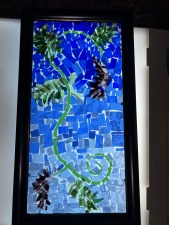|
 | |
I've taught classes and led hikes for the Keney Park Sustainability Project, The Hispanic Health Council, The Farmington River Watershed Association, Long River Kayak Company, The Connecticut Orchid Society, Rhode Island Orchid Society, New Hampshire Orchid Society, The Windsor Monarch Butterfly Association, The Windsor Garden Club, Northwest Park, Women Gone Wild, Windsor Locks Adult Education, The Windsor Public Library, and more.
Private classes are also available.
Intro to wild foraging: from lawn to plate. At your home or club, we walk around and identify the plants growing there and which are edible. Attendees are encouraged to identify edible plants both native and non-native.
Creating a butterfly garden at your home. This program focuses on native perennials and why they are preferred over non-native flowers. We also discuss the food plants of the caterpillars.
Red, White, and Blue perennial gardens. Originally designed for an Air Force Veteran, this is a perennial garden consisting of (mostly) native plants you can find at a gardening center. Emphasis is on planting a series of things that will bloom in sequence over the spring, summer, and autumn.
Monarch Butterflies, a brief history of human interaction and how you can help. I've been actively studying Monarchs since 1975. Had the privilege to be a civilian correspondent of the Insect Migration Studies at the University of Toronto Zoology Department. Can do this program for a variety of groups; talk, still photography, bibliography, or walking in the meadows.
Building a bog garden. What is a bog? Why are the plants in a bog garden different? How can you create one at your home. And why would you? Hint: I get 2 lbs or so of lovely organic cranberries each year.
Seed starting both vegetables and perennials/trees
Growing plants from woody cuttings
I've been making natural wreaths for over 2 decades. Many of the plants used come from my gardens, or plants and seed pods I've foraged.
Wreath Making 101.
Participants are shown how to bend fresh grapevines into shape for wreaths, then decorate with a variety of herbs such as Artemisia, moss, pinecones, and other natural seed pods. Should be taught in the fall, any time from September until before Christmas. As needed, we will use thin wire to secure items to the base. Capacity 10 people.
Materials cost $15 per person to be paid to the instructor
Wreath Making 201.
Participants will be given a small wreath shape and shown how to secure dried rosebuds, other fragrant herbs and spices, to make a Valentine's Day themed mini-wreath. The rose buds come from Rosa rugosa, the beach rose. They are harvested in June and dehydrated, stored in special containers until needed. They hold a remarkable fragrance. Capacity 10 people.
Materials cost $25 per person, to be paid to the instructor
|